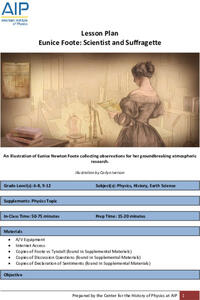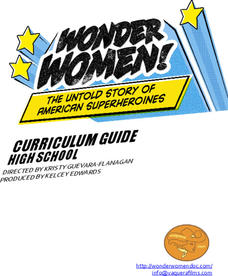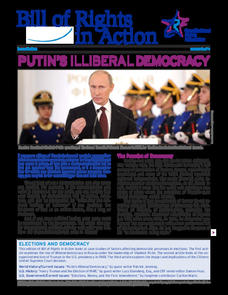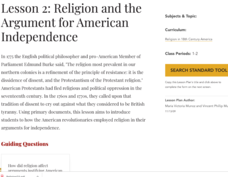Federal Reserve Bank
It's Your Paycheck
Beyond reading and arithmetic, one of the most important skills for graduating seniors to have is fiscal literacy and responsibility. Start them on the right financial track with nine lessons that focus on a variety of important...
American Institute of Physics
Eunice Foote: Scientist and Suffragette
The greenhouse effect and climate change are hot topics in today's news. Young scientists may be surprised to learn that the concept is not a new one. In fact, Eunice Newton Foote, scientist, inventor, and suffragette, discovered the...
American Institute of Physics
Women and the Manhattan Project
The Manhattan Project was a massive undertaking involving multiple sites and thousands of scientists and technicians. To gain an understanding of the women who participated in the project, groups select an oral history of a woman...
American Institute of Physics
African Americans and the Manhattan Project
A lesson plan about the Manhattan Project will explode young physicists' understanding of the racial attitudes in the United States during and after World war II. Groups select an African American scientist or technician that worked on...
Vaquera Films
Wonder Women - The Untold Story of American Superheroines: High School Curriculum Guide
A 41-page curriculum guide tells the story of the untold stories of American Superheroines! Divided into three modules, the guide is designed to be used before, during, and after viewing the 2012 documentary Wonder Women! The Untold...
Children’s Hospital of Philadelphia
Animal Research and Vaccines
Animals save lives. In small groups pupils research the role of animals in the development of vaccines. Each team investigates one disease to find out how the vaccine was developed and how animals played a role n the research. Groups...
Children’s Hospital of Philadelphia
Learning From Animals
Is all research on animals bad? Learners use a video to understand how animal research benefits humans. Pupils read about a drug modification turned deadly and the result of the 1938 Federal Food, Drug, and Cosmetic Act. Scholars use a...
Children’s Hospital of Philadelphia
The Innate Immune System
My body is my castle. Pupils learn about the innate immune system in the second lesson plan of a three-part unit on the immune system by comparing the innate immune system to a castle and moat. Groups conduct a simulation where they try...
Children’s Hospital of Philadelphia
Vaccine History and Research
It all becomes a matter of timing. Groups use a variety of resources to research the history of vaccines by first creating a timeline of vaccine research using leading scientists' work. Learners read articles to develop a story of the...
Children’s Hospital of Philadelphia
Discovery and Development of Vaccines
Stop the spread. Pupils work through two activities to gain an understanding of vaccines and immunity. Learners research different types of vaccines and how they are made and explore the advantages and disadvantages of them. Using a...
Children’s Hospital of Philadelphia
Development of Disease and Infection
It's all in the cards. Using cards to simulate a disease's attack on the immune system, pupils develop an understanding of how the immune system and pathogens react to each other and why at times the pathogen wins. Groups play a game to...
Children’s Hospital of Philadelphia
The Adaptive Immune System
Attack the pathogen from within. Learners delve deeper into the immune system and find out about the adaptive immune system such as T and B cells. Groups create graphical models of the adaptive immune system along with a multimedia...
Children’s Hospital of Philadelphia
Organs and Tissues of the Immune System
It's virus-fighting time! Pupils learn how viruses attack and reproduce and how the immune system works to protect the body. They identify unfamiliar terms and tissues and organs of the immune system. Working in small groups, scholars...
Constitutional Rights Foundation
The Troubled Elections of 1796 and 1800
Congress does more than create new laws. Political scientists delve into the elections of 1796 and 1800 to understand how political parties, the Electoral College, and personal agendas affected the election process. The resource also...
Constitutional Rights Foundation
Putin's Illiberal Democracy
Is Russia really a democracy? High school scholars explore Russian democracy under the leadership of President Putin. The resource provides opportunity for group discussion, writing, and research to understand Russia's political history,...
New York City Department of Education
The Game of Life
Academics use their research skills to create a financial guidebook for young adults. They also learn about the skills needed to be successful as an adult, including how to use credit cards and how to buy a car. Hands-on activities and...
Kenan Fellows
An Analytical Chemist, a Biochemist, an Animal Scientist, and an Oncologist Walk into a Lab...No Joke
Oncology presents multiple opportunities for research and the collaboration of many different types of scientists. Scholars divide into groups and research the history of mass spectrometry, polarity/non-polarity,...
National Endowment for the Humanities
Lesson 4 James Madison: Internal Improvements Balancing Act—Federal/State and Executive/Legislative
Who has the power? The founding fathers asked the same question when the United States was formed. Learners explore issues that arose during Madison’s presidency that raised constitutional questions. Through discovery, discussion, and...
Library of Congress
Thomas Jefferson's Library: Making the Case for a National Library
The United States Library of Congress, the largest library in the world. But such was not always the case. The library was destroyed during the War of 1812. In a persuasive letter to Samuel H. Smith, Thomas Jefferson offered to sell his...
National Endowment for the Humanities
Lesson 2: Religion and the Argument for American Independence
Young scholars examine how religion affected arguments justifying American independence. They read and analyze primary source documents, and write an essay analyzing how Americans used religious arguments to justify revolution against a...
National Endowment for the Humanities
Lesson 1: The First Great Awakening
High schoolers examine the First Great Awakening and how it affected religious belief in colonial America. They read and analyze primary source documents, explore various websites, and write a five-paragraph essay examining the beliefs...
Children’s Hospital of Philadelphia
Case Studies: Influenza and HIV
Stop infection spread. Pupils participate in an activity to model infections and replications of viruses. Within the activity, scholars see that viruses may end up with genetic variation and connect that to how some forms of the flu are...
Curated OER
Centers of the Storm: The Lyceum and the Circle at the University of Mississippi
Greek Revival architecture and the Civil Rights Movement? Sure! Examine how the Lyceum and Circle, two historic buildings located on the campus of the University of Mississippi, relate to integration and the 1962 riot on the university...
National Endowment for the Humanities
Slavery and the American Founding: The "Inconsistency Not to Be Excused"
High schoolers examine slavery in the revolutionary and colonial eras of the United States. In this slavery lesson, students investigate the presence of slavery in early America, the language of the Constitution, and the intent of the...

























